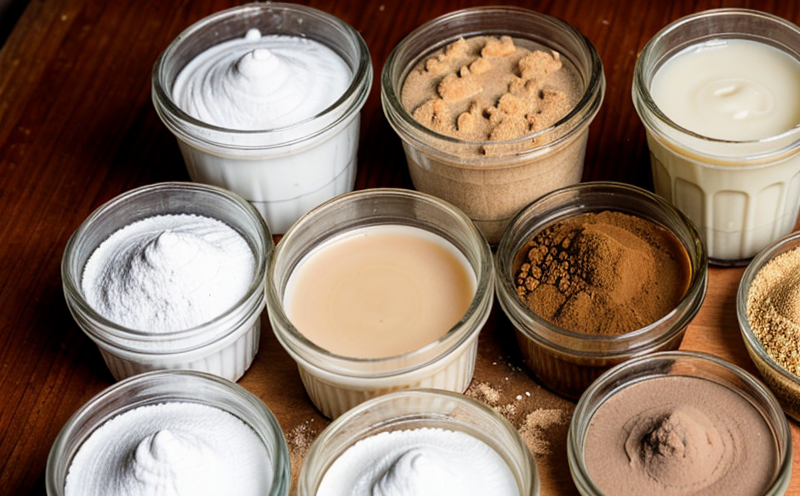CLSI M60 Guidelines for Enumeration of Yeasts in Food Microbiology
The CLSI (formerly known as the Clinical and Laboratory Standards Institute) M60 guidelines provide a standardized methodology for the enumeration and identification of yeasts in food samples. This service is essential for ensuring product safety, compliance with regulatory standards, and maintaining consumer confidence. Yeast contamination can lead to spoilage or fermentation issues, which are critical concerns in the food industry.
Yeast species play a significant role in the spoilage of food products, especially those containing high levels of sugar or moisture. Common yeasts such as Saccharomyces cerevisiae, Brettanomyces, and Candida can cause rapid changes in product quality, leading to economic losses for manufacturers. By adhering to the CLSI M60 guidelines, laboratories can provide accurate enumeration results that aid in process control, shelf-life extension, and improved food safety.
The enumeration of yeasts is a complex process due to their diverse metabolic capabilities and ability to grow under various environmental conditions. The CLSI M60 guidelines outline specific procedures for sample preparation, inoculation, incubation, and counting, ensuring that the results are both reproducible and accurate. This service is particularly important in sectors such as dairy, bakery, and confectionery where yeast contamination can have significant impacts on product quality.
The CLSI M60 method involves several key steps:
- Sample Preparation: The sample must be properly homogenized to ensure uniform distribution of yeasts. This is crucial for accurate enumeration.
- Inoculation and Incubation: Yeast colonies are grown on specific media under controlled conditions, typically at 25°C or 30°C depending on the species.
- Enumeration: The number of yeast colonies is counted after incubation. This count provides a quantitative measure of yeast contamination in the sample.
The CLSI M60 guidelines also emphasize the importance of quality control and assurance, ensuring that laboratories maintain high standards of accuracy and precision. Regular calibration of equipment and validation of procedures are essential components of this service.
By adhering to these guidelines, food manufacturers can ensure consistent product quality, comply with regulatory requirements, and protect consumer health. This service is particularly valuable for companies involved in the development of new products or those undergoing audits by regulatory bodies such as FDA, EU Commission, or other national authorities.
Scope and Methodology
The CLSI M60 guidelines provide a comprehensive framework for the enumeration of yeasts in food samples. The methodology involves several key steps:
| Step | Description |
|---|---|
| Sample Collection | Collect representative samples from production batches or finished products. |
| Preparation | Homogenize the sample to ensure uniform distribution of yeasts for accurate enumeration. |
| Inoculation | Inoculate appropriate media and incubate under controlled conditions (25°C or 30°C). |
| Counting | Count yeast colonies after incubation on selective media using a standard method, such as the plate count technique. |
The CLSI M60 guidelines also provide detailed instructions for the selection of appropriate media, inoculation techniques, and counting methods. The use of selective media ensures that only yeast colonies are counted, minimizing interference from other microorganisms. This service is particularly useful in environments where strict adherence to international standards is required.
Eurolab Advantages
At Eurolab, we ensure that all our services meet the highest standards of accuracy and precision. Our CLSI M60 yeast enumeration service offers several key advantages:
- Expertise: Our team of microbiologists is highly skilled in food microbiology and adheres strictly to international standards.
- Technology: We use state-of-the-art equipment for sample preparation, inoculation, and counting, ensuring reliable results.
- Quality Control: Eurolab maintains rigorous quality control procedures to ensure consistent accuracy across all samples.
- Compliance: Our services are designed to meet the regulatory requirements of major food safety agencies worldwide.
By choosing Eurolab for your CLSI M60 yeast enumeration needs, you can be confident in the quality and reliability of our results. Our commitment to excellence ensures that you receive accurate and timely data to support your product development and compliance efforts.
Environmental and Sustainability Contributions
The CLSI M60 yeast enumeration service at Eurolab contributes positively to environmental sustainability in several ways:
- Reduced Waste: By providing accurate data on yeast contamination, our service helps manufacturers optimize their production processes, reducing waste.
- Safe Products: Ensuring product safety through accurate enumeration reduces the risk of recalls and consumer harm.
- Resource Efficiency: Accurate enumeration allows for better resource management, leading to more efficient use of raw materials.
The service also promotes sustainable practices by supporting regulatory compliance, which can lead to longer shelf lives and reduced food waste. By partnering with Eurolab, you contribute to a more sustainable future in the food industry.





